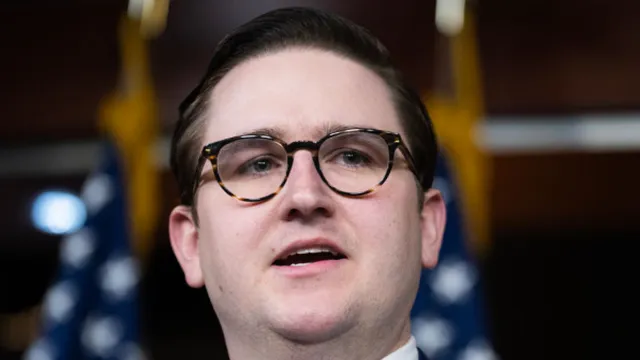
Rep. Addison McDowell praises Trump as transformational leader
2025-06-28 17:23- The Senate is close to finalizing legislation associated with President Trump’s agenda, aiming for a signing event coinciding with July 4.
- The bill includes major provisions for tax cuts, border security, and energy production, facing opposition from Democratic lawmakers.
- Rep. Addison McDowell believes this legislation could establish Trump as a historically significant president.
Express your sentiment!
Insights
In the United States, Rep. Addison McDowell of North Carolina recently highlighted the progress toward finalizing President Donald Trump’s significant legislative initiative known as the 'One Big Beautiful Bill.' This bill aims to serve as a cornerstone of Trump’s agenda, aiming for a signing ceremony around the July 4 holiday, marking a pivotal moment for both the administration and the economy. McDowell expressed optimism about the bill's potential to restore the nation’s direction after the previous administration and emphasized that it encapsulates the promises made by Trump to the American people. The proposed legislation has generated considerable debate, especially around its provisions, which include extending the tax cuts instituted in 2017, eliminating taxes on tips and overtime, enhancing border security funding, and promoting domestic energy production. Yet, opposition from Democratic legislators has intensified, who have denounced the bill as a conduit for the largest tax increase in U.S. history, stressing that it adversely affects everyday Americans. McDowell criticized this stance, advocating for the bill as essential for job creation and economic stability, and suggested that the resistance stems from political motivations rather than the bill's actual effects. While the Republicans push forward with the passage of this bill, Democratic leaders are adamant about prolonging discussions to dissect its complex provisions. Senate Minority Leader Chuck Schumer has indicated plans to force the entire bill to be read out loud, potentially consuming extensive amounts of time as a strategic maneuver to scrutinize it thoroughly. This move is meant to delay the Republicans' momentum while they seek to solidify support for the bill. This back-and-forth between the two parties not only underscores the contentious nature of the legislation but also reflects broader tensions within the halls of Congress. These ongoing negotiations and debates highlight how critical legislation has become as a tool for the respective parties to assert their ideologies and platforms. McDowell's remarks about Trump’s potential legacy further highlight the Republicans’ confidence in their leadership, asserting that Trump’s administration is achieving notable successes both domestically and on the global stage. His closing thoughts suggest a belief that, despite opposition, the administration is resilient and focused on delivering on its commitments to the American populace, embodying what he claims to be a return to more conservative American values. As this legislative momentum builds, the outcomes of these discussions and votes could have lasting implications for the future of the country's economic and political landscape.
Contexts
The impact of Donald Trump's legislative initiatives on the economy remains a prominent topic of analysis among economists and political analysts. During his presidency from 2017 to 2021, he implemented various policies aimed at stimulating economic growth, such as the Tax Cuts and Jobs Act of 2017. This legislation aimed to reduce the corporate tax rate dramatically and provided tax cuts for individuals. Proponents argue that these tax reforms fueled economic expansion by increasing disposable income, encouraging consumer spending, and promoting business investment. Conversely, critics contend that the tax cuts disproportionately benefited the wealthy and increased the federal deficit, leading to potential long-term economic challenges that could dampen future growth prospects. In addition to tax reform, Trump's administration also focused on deregulation, which supporters argue spurred economic activity by reducing compliance costs for businesses. A significant amount of regulatory rollback occurred in industries such as energy and finance. This deregulation was touted as a means to foster greater economic competitiveness and job creation; however, opponents pointed out that it could lead to adverse effects on the environment and consumer protection. Overall, while there were short-term boosts in GDP and employment rates following these initiatives, the long-term effects are still debated, particularly in light of the COVID-19 pandemic's impact on the economy. Moreover, Trump's trade policies, particularly his approach to international relations and tariffs, have had substantial implications for the U.S. economy. The imposition of tariffs on goods from countries such as China resulted in a trade war that aimed to protect American manufacturing jobs and reduce trade deficits. While some sectors benefitted from the focus on American-made products, others, particularly those reliant on international supply chains, faced increased costs, which may lead to higher consumer prices and disrupted markets. The overall effect of these trade policies is complex, with varying outcomes across different industries and regions. In summary, Trump's legislative initiatives have left a mixed legacy on the economy. While there were instances of economic acceleration and job creation during his tenure, the foundations of these policies—tax cuts, deregulation, and trade strategies—have raised critical questions about equity and sustainability. The true long-term impact of these changes will continue to unfold, requiring ongoing analysis and evaluation, particularly as the global economic landscape evolves in response to crises such as the pandemic and geopolitical shifts.